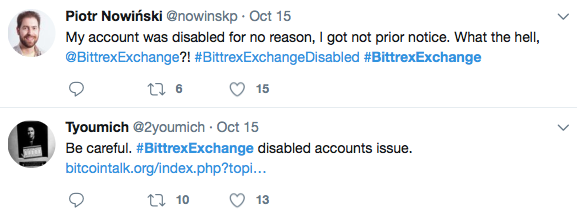Bittrex shutting down accounts - A short guide to keeping your investments safe in times of turbulence
Dear Steemiacs,
today I would like to share my thoughts on one important aspect of the cryptocurrency space: Keeping your funds safe.

The most recent incident concerning the Bittrex exchange provides another occasion to become wary when it comes to securing your digital assets.

As can be read on https://cointelegraph.com/news/bitcoin-altcoin-exchange-bittrex-eyed-with-suspicion-due-to-thousands-of-mysterious-account-closings Bittrex started shutting down verified and enhanced accounts for no obvious reason and a rather unsatisfactory official statement (compliance review).
If you haven't heard about the Mt.Gox incident yet, you are lucky since that means you haven't lost any of your bitcoins. All the more reason you should put some thoughts into how you want to prevent from something like that happening to you.
We already had some issues with Poloniex months back making people skeptical and afraid of losing funds. This surge in uncertainty is not healthy psychologically even if there is no underlying long-term malicious intentions behind.
Other occasions on which you should have made sure that your funds are in the right place is before oncoming forks when transactions are starting to lag behind and you might miss the opportunity to gain profits.
So which strategy tackles both issues? Planning ahead even if that means to put in more effort and time in managing your funds. As long as that helps to minimize your exposure to risky activities of third parties, in the long-term it is well-invested time.
What should you do?
1. Join a cryptocurrency group: this can be either a group of cryptoenthusiast friends, a facebook group (such as “cryptocurrency collector's club”), or a Steemit chat. Subscribe to channels of knowledgeable people on youtube. Basically, get exposure to as much information as you can. It can be passive such as the news pop up in your feed and it does not take you any effort to detect relevant facts.
2. If you are an active trader, distribute your funds over several exchanges. This makes sure that you don't lose everything if your single-trusted exchange engages in criminal activity, gets hacked or shuts down your account for an unforeseeable reason temporarily and you miss out on a long or short trade.
3. If you are a HODLER or have only a part of your portfolio that you trade actively, make sure you store the cryptocurrencies you really believe in off exchanges. This ensures that you have control over your private wallet keys. To be even more safe store your long-term investments offline, on a hardware wallet or, a little more paranoid and if available, in paper form.
Ad 2: You can use several reputable exchanges with high liquidity, such as Coinbase / GDAX, Bitfinex, Bittrex, Kraken or Bitstamp. You can find exchanges with highest volumes listed on https://coinmarketcap.com/exchanges/volume/24-hour/ .
Ad 3. Ledger (Nano S - which I use personally) and Trezor hardware wallets are very safe ways to store a number of the big coins offline (Bitcoin, Ethereum, Litecoin, Zcash, Stratis, Ripple, ...). Ledger has Google Chrome Apps that help you to access your wallets easily and to send and receive transactions. It is advisable to not send funds directly from exchanges to your hardware wallet since the exchanges would then know your personal addresses.
You can use intermediary wallets instead, such as mobile wallets like Jaxx, and then send from there to your hardware wallet address (although that means double spending on transactions fees). Jaxx might also be a good way to store a multitude of your investments, yet it is an online wallet and security breaches were reported in the past.
The best way, in my opinion, to store your favorite coins that you might want to access quickly for trading if you do not want to invest in a hardware wallet, is to directly use the wallets provided by the developers or communities: Myetherwallet.com for Ethereum (you can also store ERC20 tokens on your Ledger by accessing the ledger Ethereum wallets through myetherwallet), Waveswallet.io for Waves, Steemit for Steem, Monero wallet for Monero etc. Always make sure you access the true site (check for https:// protocol and typos in the address). There were scam sites in the past with fake addresses trying to fish for myetherwallet private keys.
Be sure to move your funds quickly off exchanges to more trustworthy online or hardware wallets once news of potential exchange vulnerability or instability appear, or in times of uncertainty, such as during upcoming forks!
And last: write down all your account and wallet access data, (login names, passwords, private keys) in at least two copies in paper format (laminated if needs be to prevent water damage). Don't store the private keys on your hard drive! Check three times if you copied the private key directly to the paper correctly. Although doing this appears very cumbersome in times of copy-and-pasting on digital devices, it will certainly pay off when you need to access your wallet with a considerable sum in it.

Image sources: Pixabay, Twitter, media.giphy
Upvote & Resteem
Very interesting post, I follow your advisor.
Thanks
Thanks for joining my blog. I'm glad you found it informative!
@replichara

we are waiting for the innovations.